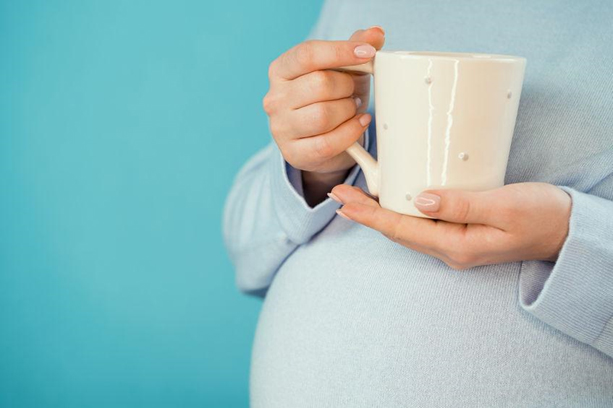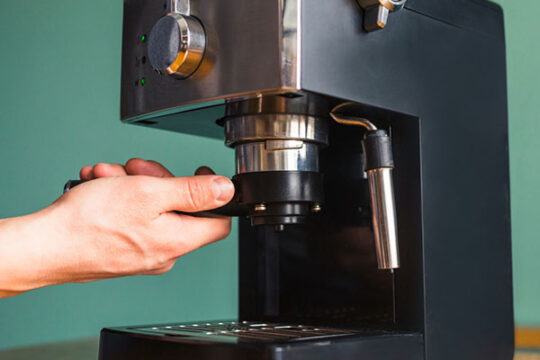There are a lot of changes to the body as it journeys through pregnancy, and with those changes come “rules”. Women are admonished to avoid pate, soft cheese, organ meats, raw eggs, raw meat, and there’s often a big question mark over the consumption of caffeine. Or, more to the point – coffee. With a changing body, it can be a challenge to completely turn one’s habits and diet upside down to cater to the bun in the oven.
The long and short of it is that you can consume coffee whilst pregnant. You don’t have to cut caffeine out of your diet entirely. Once upon a time, women were admonished to avoid coffee and caffeine in any form and at any amount. Thankfully, as we learn more through studies and experiments, science changes and improves.
Research Says…
 According to the American College of Obstetricians and Gynecologists, a pregnant woman can safely consume 200mg of caffeine daily. That is half the normal recommended allowance for the average adult and equates to two (8oz) cups of coffee. That’s not so bad, is it?
According to the American College of Obstetricians and Gynecologists, a pregnant woman can safely consume 200mg of caffeine daily. That is half the normal recommended allowance for the average adult and equates to two (8oz) cups of coffee. That’s not so bad, is it?
If you do regularly exceed this limit, you may increase your risk of miscarriage. Additionally, caffeine can cross the placenta so it isn’t worth the risk to your fetus. As you embark on your pregnancy journey, remember that the real risk of coffee comes from the caffeine, and caffeine is found in a range of other food and beverages. So, if you plan to drink two cups of coffee daily, you have to limit your intake of tea, energy drinks, soda, and chocolate. Of course, you can opt for decaffeinated coffee as well. It offers most of the same health benefits as caffeinated coffee does, without the injection of caffeine. Though, beware, many decaffeinated coffee options also contain a dose of caffeine.
The way coffee is brewed, the bran itself, and the roast can all influence the level of caffeine you consume. So, be wary of where you drink coffee and check nutritional data and labels before you go overboard.
While coffee comes with a wide range of health benefits, such as protection against depression, heart disease, stroke, and more, there are risks when it comes to caffeine consumption. Let’s take a look.
Side Effects & Risks
Much of the research into how caffeine impacts the unborn is inconclusive, which is why the experts recommend 200mg of caffeine daily. There have been various studies over the years which have linked high levels of caffeine consumption with miscarriage, which means it’s simply not worth the risk.
There are other side effects and risks to consider. For example, coffee is a diuretic, which is annoying at the best of times, but everyone who has experienced pregnancy knows how often they run to the restroom. You may find that coffee gets kicked off your to-do list in the later stages of pregnancy when restroom visits become more challenging.
A common side effect of coffee is heartburn of indigestion, this is a common side effect of pregnancy as well. With those two factors combined, heartburn can become unbearable.
People often experience jitters or shakes when they overdo it with caffeine, you may find that you are more sensitive to the effects of caffeine during pregnancy. Caffeine can influence your body’s iron-absorbing abilities, which leaves you at risk of anemia. For anyone dealing with low iron levels, coffee during pregnancy might not be the wisest decision.
The Benefits
Having highlighted the risks, it’s just as important that we highlight the benefits! The benefits of drinking coffee during pregnancy are much the same as drinking coffee any other time. Coffee provides you with an energy boost, makes you more alert, and can help you with your focus. What you won’t find, however, are specific benefits that are unique to pregnancy. So, if you weren’t a big coffee drinker before you got pregnant, you don’t need to become a coffee drinker now. However, if you have long loved coffee, you don’t have to give up for the gestation. You are free to enjoy coffee just as you always have, well, just half as much.
To note: an eight-ounce cup of brewed coffee contains around 95mg of caffeine, however, it can contain up to 165mg. It’s always wise to check. If you normally drink six cups of coffee, the worst thing you can do is suddenly drink no cups of coffee. You can cut down gradually until you are at just a cup or two of coffee daily. Remember, it’s only temporary!





